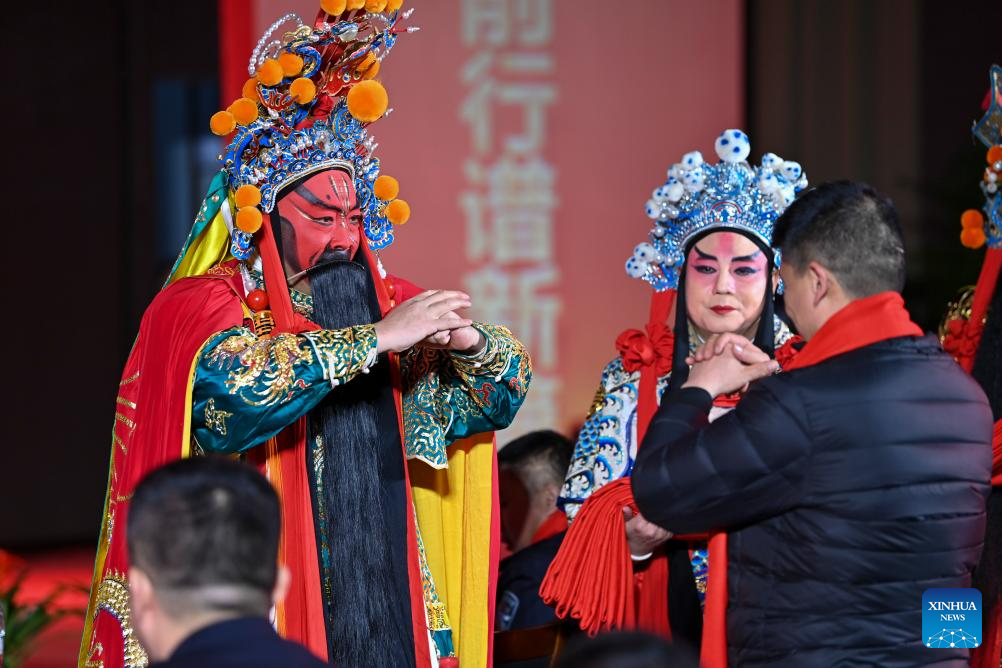
Wu Lingyun (L) interacts with the audience during a performance in Yingze District of Taiyuan, north China's Shanxi Province, Feb. 2, 2024. Jin Opera, originated in the central area of Shanxi Province, is a representative genre of opera in Shanxi. It was listed as a national intangible cultural heritage in 2006.
Wu Lingyun, a representative inheritor of Jin Opera, was born in a family of Jin Opera actors and entered the opera troupe at the age of 12. In 1985, when he was 21, Wu started to play the role of Guan Yu, an ancient general known for his loyalty and bravery in battles and widely revered by the Chinese. In order to play the role well, Wu went through books on the history of Three Kingdoms period (220-280 A.D.) of China, learned from experienced actors and other genres of Chinese operas, and drew inspirations from sculpture, painting, shadow play and other art forms. After years of accumulation, the role of Guan Yu has become Wu Lingyun's representative performance.
Decades of stage career have left unique marks on Wu's face. Wrinkles extend to his forehead and sideburns for he wears the head ornaments for a long time which pulls his facial skin.
At the age of retirement, he still feels the heavy responsibility of inheriting and promoting this excellent traditional culture. "I would love to keep on performing as long as the audience applaud," Wu said. (Xinhua/Yang Chenguang)
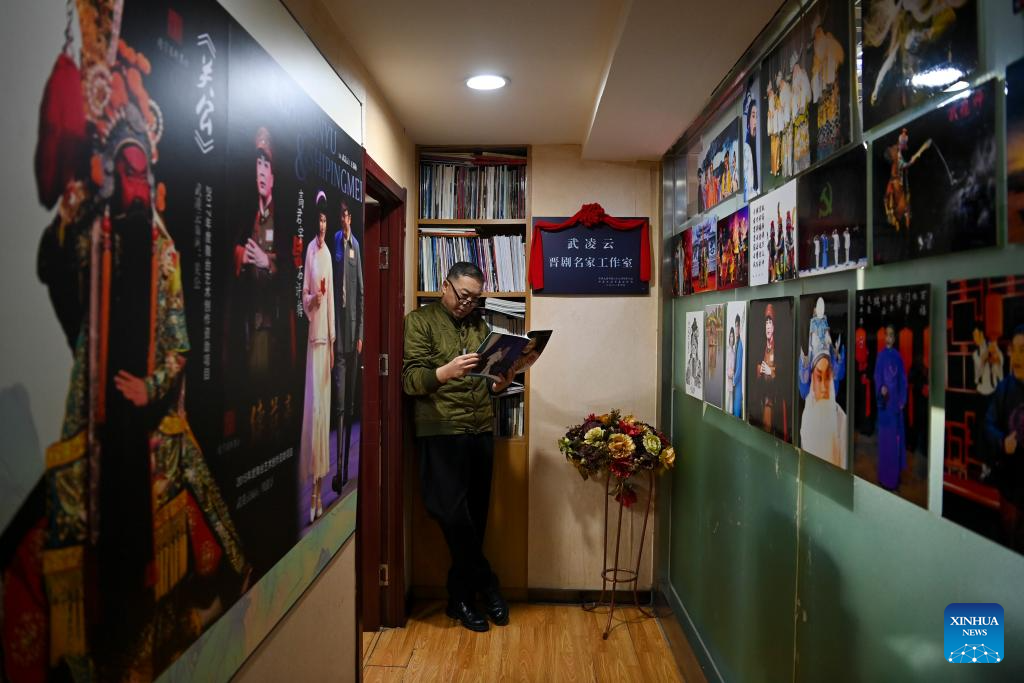
Wu Lingyun reads a book at the Jin Opera art research institute in Taiyuan, north China's Shanxi Province, Feb. 6, 2024. Jin Opera, originated in the central area of Shanxi Province, is a representative genre of opera in Shanxi. It was listed as a national intangible cultural heritage in 2006.
Wu Lingyun, a representative inheritor of Jin Opera, was born in a family of Jin Opera actors and entered the opera troupe at the age of 12. In 1985, when he was 21, Wu started to play the role of Guan Yu, an ancient general known for his loyalty and bravery in battles and widely revered by the Chinese. In order to play the role well, Wu went through books on the history of Three Kingdoms period (220-280 A.D.) of China, learned from experienced actors and other genres of Chinese operas, and drew inspirations from sculpture, painting, shadow play and other art forms. After years of accumulation, the role of Guan Yu has become Wu Lingyun's representative performance.
Decades of stage career have left unique marks on Wu's face. Wrinkles extend to his forehead and sideburns for he wears the head ornaments for a long time which pulls his facial skin.
At the age of retirement, he still feels the heavy responsibility of inheriting and promoting this excellent traditional culture. "I would love to keep on performing as long as the audience applaud," Wu said. (Xinhua/Yang Chenguang)
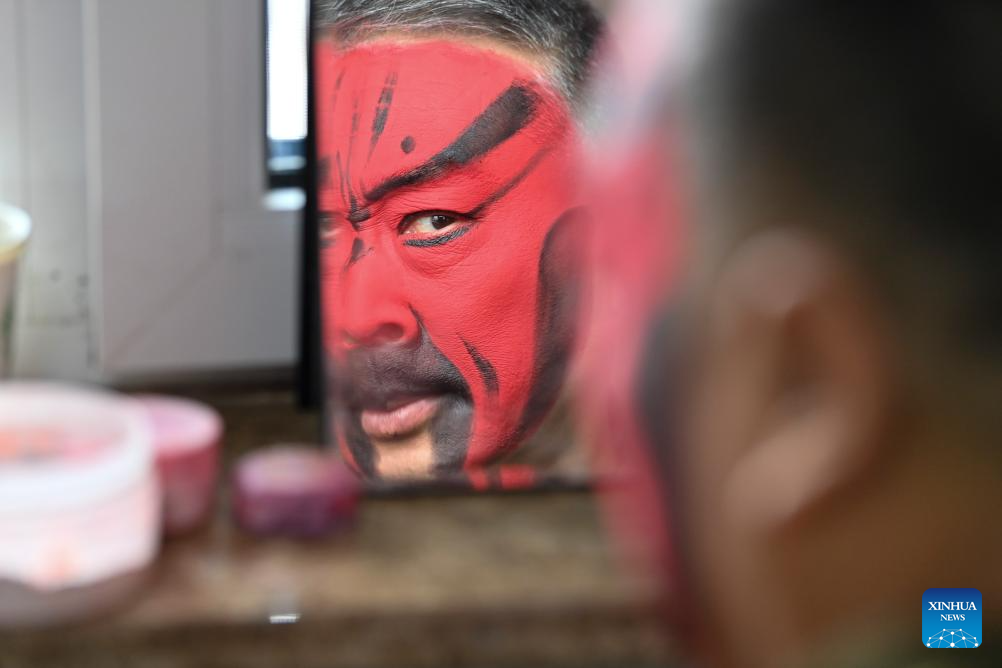
Wu Lingyun prepares for a performance in Yingze District of Taiyuan, north China's Shanxi Province, Feb. 2, 2024. Jin Opera, originated in the central area of Shanxi Province, is a representative genre of opera in Shanxi. It was listed as a national intangible cultural heritage in 2006.
Wu Lingyun, a representative inheritor of Jin Opera, was born in a family of Jin Opera actors and entered the opera troupe at the age of 12. In 1985, when he was 21, Wu started to play the role of Guan Yu, an ancient general known for his loyalty and bravery in battles and widely revered by the Chinese. In order to play the role well, Wu went through books on the history of Three Kingdoms period (220-280 A.D.) of China, learned from experienced actors and other genres of Chinese operas, and drew inspirations from sculpture, painting, shadow play and other art forms. After years of accumulation, the role of Guan Yu has become Wu Lingyun's representative performance.
Decades of stage career have left unique marks on Wu's face. Wrinkles extend to his forehead and sideburns for he wears the head ornaments for a long time which pulls his facial skin.
At the age of retirement, he still feels the heavy responsibility of inheriting and promoting this excellent traditional culture. "I would love to keep on performing as long as the audience applaud," Wu said. (Xinhua/Yang Chenguang)
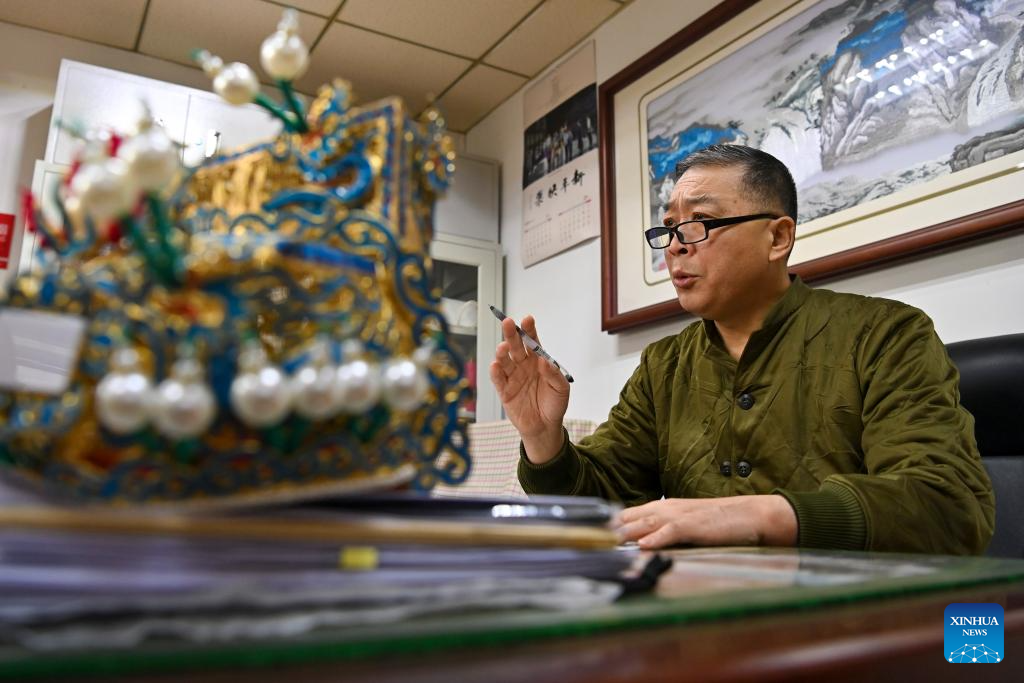
Wu Lingyun studies a play at the Jin Opera art research institute in Taiyuan, north China's Shanxi Province, Feb. 6, 2024. Jin Opera, originated in the central area of Shanxi Province, is a representative genre of opera in Shanxi. It was listed as a national intangible cultural heritage in 2006.
Wu Lingyun, a representative inheritor of Jin Opera, was born in a family of Jin Opera actors and entered the opera troupe at the age of 12. In 1985, when he was 21, Wu started to play the role of Guan Yu, an ancient general known for his loyalty and bravery in battles and widely revered by the Chinese. In order to play the role well, Wu went through books on the history of Three Kingdoms period (220-280 A.D.) of China, learned from experienced actors and other genres of Chinese operas, and drew inspirations from sculpture, painting, shadow play and other art forms. After years of accumulation, the role of Guan Yu has become Wu Lingyun's representative performance.
Decades of stage career have left unique marks on Wu's face. Wrinkles extend to his forehead and sideburns for he wears the head ornaments for a long time which pulls his facial skin.
At the age of retirement, he still feels the heavy responsibility of inheriting and promoting this excellent traditional culture. "I would love to keep on performing as long as the audience applaud," Wu said. (Xinhua/Yang Chenguang)
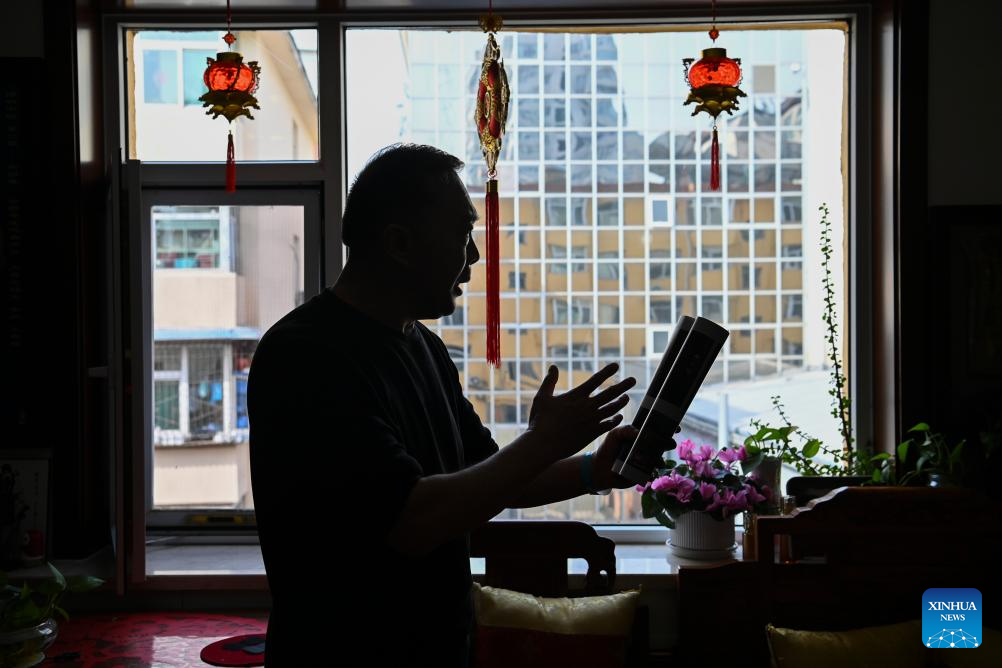
Wu Lingyun prepares for performances at home in Xinghualing District of Taiyuan, north China's Shanxi Province, March 26, 2024. Jin Opera, originated in the central area of Shanxi Province, is a representative genre of opera in Shanxi. It was listed as a national intangible cultural heritage in 2006.
Wu Lingyun, a representative inheritor of Jin Opera, was born in a family of Jin Opera actors and entered the opera troupe at the age of 12. In 1985, when he was 21, Wu started to play the role of Guan Yu, an ancient general known for his loyalty and bravery in battles and widely revered by the Chinese. In order to play the role well, Wu went through books on the history of Three Kingdoms period (220-280 A.D.) of China, learned from experienced actors and other genres of Chinese operas, and drew inspirations from sculpture, painting, shadow play and other art forms. After years of accumulation, the role of Guan Yu has become Wu Lingyun's representative performance.
Decades of stage career have left unique marks on Wu's face. Wrinkles extend to his forehead and sideburns for he wears the head ornaments for a long time which pulls his facial skin.
At the age of retirement, he still feels the heavy responsibility of inheriting and promoting this excellent traditional culture. "I would love to keep on performing as long as the audience applaud," Wu said. (Xinhua/Yang Chenguang)
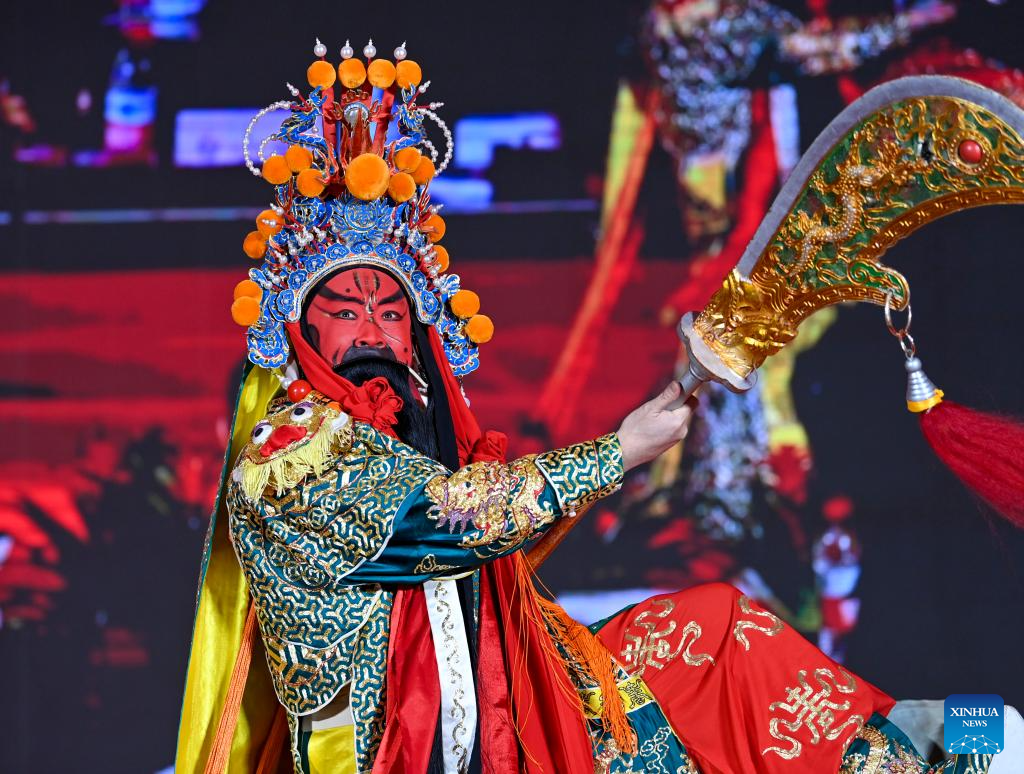
Wu Lingyun stages a performance in Yingze District of Taiyuan, north China's Shanxi Province, Feb. 2, 2024. Jin Opera, originated in the central area of Shanxi Province, is a representative genre of opera in Shanxi. It was listed as a national intangible cultural heritage in 2006.
Wu Lingyun, a representative inheritor of Jin Opera, was born in a family of Jin Opera actors and entered the opera troupe at the age of 12. In 1985, when he was 21, Wu started to play the role of Guan Yu, an ancient general known for his loyalty and bravery in battles and widely revered by the Chinese. In order to play the role well, Wu went through books on the history of Three Kingdoms period (220-280 A.D.) of China, learned from experienced actors and other genres of Chinese operas, and drew inspirations from sculpture, painting, shadow play and other art forms. After years of accumulation, the role of Guan Yu has become Wu Lingyun's representative performance.
Decades of stage career have left unique marks on Wu's face. Wrinkles extend to his forehead and sideburns for he wears the head ornaments for a long time which pulls his facial skin.
At the age of retirement, he still feels the heavy responsibility of inheriting and promoting this excellent traditional culture. "I would love to keep on performing as long as the audience applaud," Wu said. (Xinhua/Yang Chenguang)
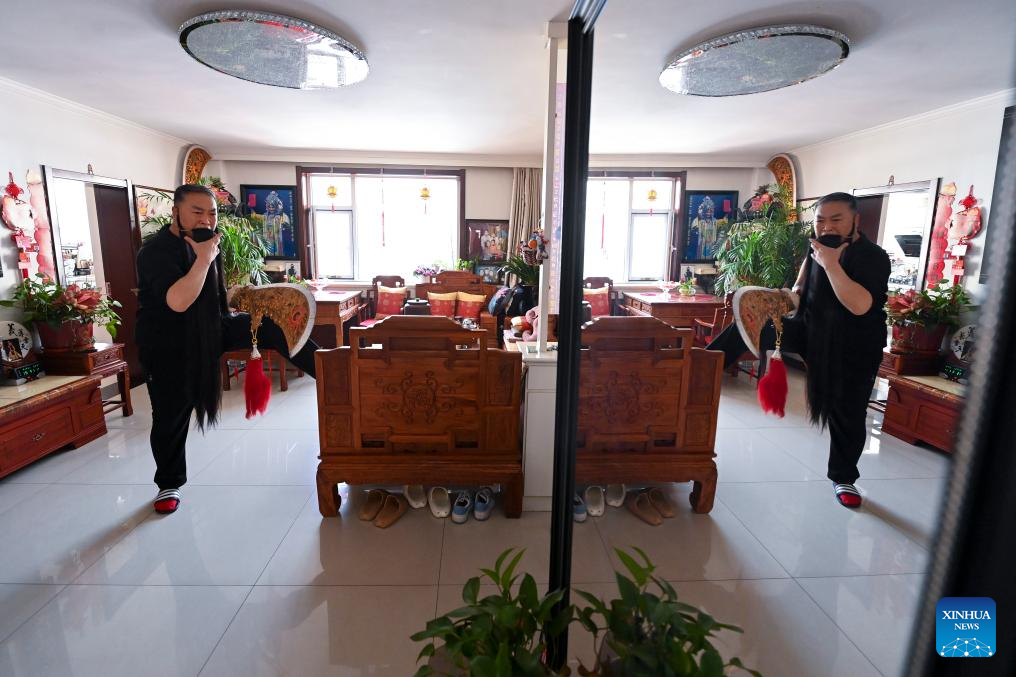
Wu Lingyun practises at home in Xinghualing District of Taiyuan, north China's Shanxi Province, March 26, 2024. Jin Opera, originated in the central area of Shanxi Province, is a representative genre of opera in Shanxi. It was listed as a national intangible cultural heritage in 2006.
Wu Lingyun, a representative inheritor of Jin Opera, was born in a family of Jin Opera actors and entered the opera troupe at the age of 12. In 1985, when he was 21, Wu started to play the role of Guan Yu, an ancient general known for his loyalty and bravery in battles and widely revered by the Chinese. In order to play the role well, Wu went through books on the history of Three Kingdoms period (220-280 A.D.) of China, learned from experienced actors and other genres of Chinese operas, and drew inspirations from sculpture, painting, shadow play and other art forms. After years of accumulation, the role of Guan Yu has become Wu Lingyun's representative performance.
Decades of stage career have left unique marks on Wu's face. Wrinkles extend to his forehead and sideburns for he wears the head ornaments for a long time which pulls his facial skin.
At the age of retirement, he still feels the heavy responsibility of inheriting and promoting this excellent traditional culture. "I would love to keep on performing as long as the audience applaud," Wu said. (Xinhua/Yang Chenguang)
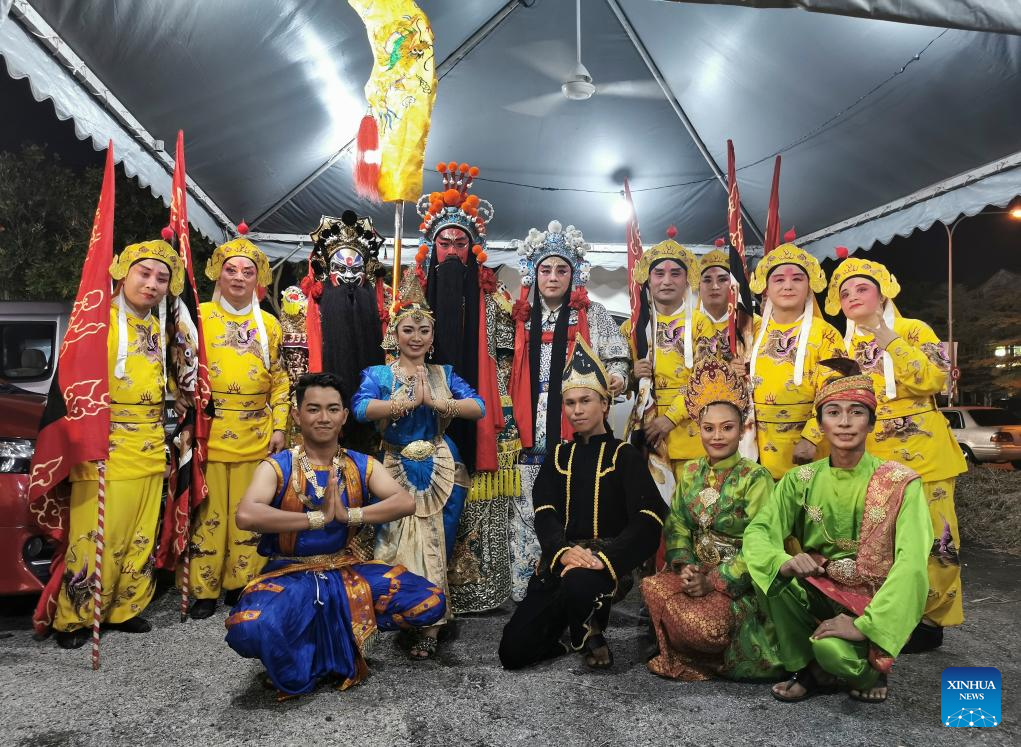
This file photo taken on Oct. 23, 2019 shows Wu Lingyun (4th L, back) and his troupe members posing for a photo with local actors during an international Guan Gong cultural festival in Malaysia. Jin Opera, originated in the central area of Shanxi Province, is a representative genre of opera in Shanxi. It was listed as a national intangible cultural heritage in 2006.
Wu Lingyun, a representative inheritor of Jin Opera, was born in a family of Jin Opera actors and entered the opera troupe at the age of 12. In 1985, when he was 21, Wu started to play the role of Guan Yu, an ancient general known for his loyalty and bravery in battles and widely revered by the Chinese. In order to play the role well, Wu went through books on the history of Three Kingdoms period (220-280 A.D.) of China, learned from experienced actors and other genres of Chinese operas, and drew inspirations from sculpture, painting, shadow play and other art forms. After years of accumulation, the role of Guan Yu has become Wu Lingyun's representative performance.
Decades of stage career have left unique marks on Wu's face. Wrinkles extend to his forehead and sideburns for he wears the head ornaments for a long time which pulls his facial skin.
At the age of retirement, he still feels the heavy responsibility of inheriting and promoting this excellent traditional culture. "I would love to keep on performing as long as the audience applaud," Wu said. (Xinhua)
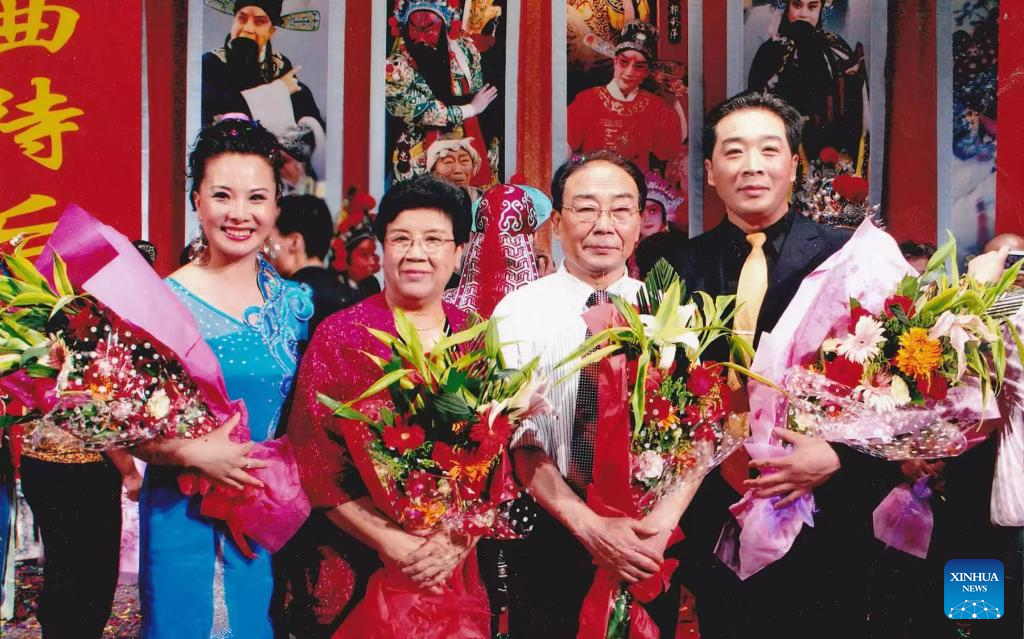
This is an undated file photo of Wu Lingyun (1st R) and his wife Wang Chunmei (1st L), his mother Yan Huizhen (2nd L), and his father Wu Zhong. All of them are China's national first-class actors. Jin Opera, originated in the central area of Shanxi Province, is a representative genre of opera in Shanxi. It was listed as a national intangible cultural heritage in 2006.
Wu Lingyun, a representative inheritor of Jin Opera, was born in a family of Jin Opera actors and entered the opera troupe at the age of 12. In 1985, when he was 21, Wu started to play the role of Guan Yu, an ancient general known for his loyalty and bravery in battles and widely revered by the Chinese. In order to play the role well, Wu went through books on the history of Three Kingdoms period (220-280 A.D.) of China, learned from experienced actors and other genres of Chinese operas, and drew inspirations from sculpture, painting, shadow play and other art forms. After years of accumulation, the role of Guan Yu has become Wu Lingyun's representative performance.
Decades of stage career have left unique marks on Wu's face. Wrinkles extend to his forehead and sideburns for he wears the head ornaments for a long time which pulls his facial skin.
At the age of retirement, he still feels the heavy responsibility of inheriting and promoting this excellent traditional culture. "I would love to keep on performing as long as the audience applaud," Wu said. (Xinhua)
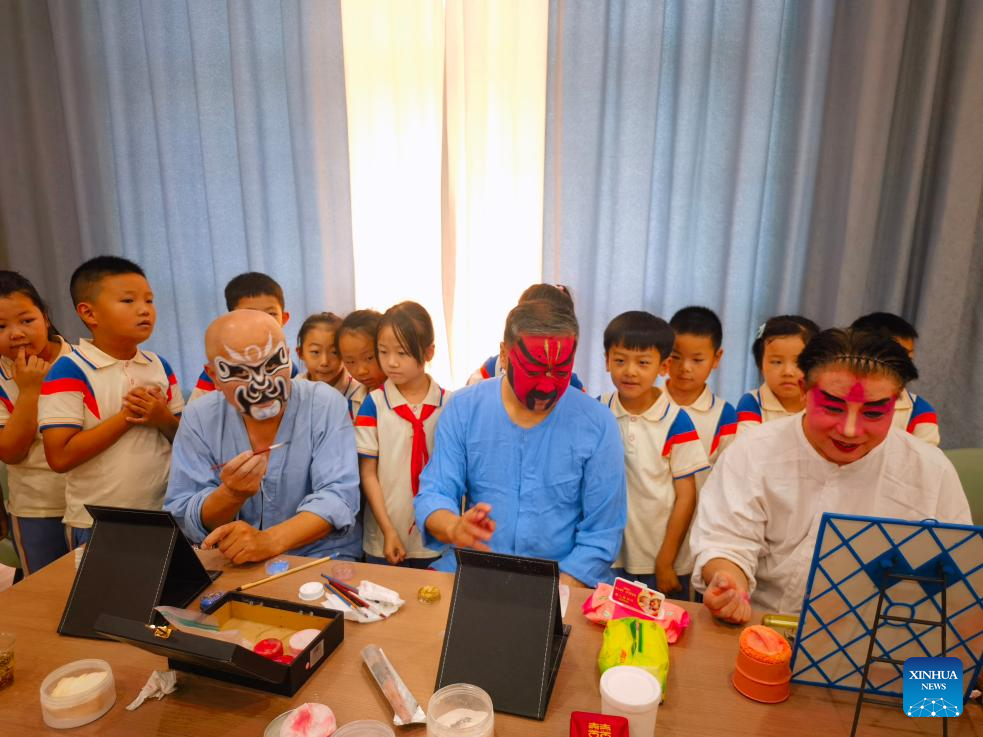
Wu Lingyun (C, front) communicates with pupils at a primary school in Xinghualing District of Taiyuan, north China's Shanxi Province, June 26, 2023. Jin Opera, originated in the central area of Shanxi Province, is a representative genre of opera in Shanxi. It was listed as a national intangible cultural heritage in 2006.
Wu Lingyun, a representative inheritor of Jin Opera, was born in a family of Jin Opera actors and entered the opera troupe at the age of 12. In 1985, when he was 21, Wu started to play the role of Guan Yu, an ancient general known for his loyalty and bravery in battles and widely revered by the Chinese. In order to play the role well, Wu went through books on the history of Three Kingdoms period (220-280 A.D.) of China, learned from experienced actors and other genres of Chinese operas, and drew inspirations from sculpture, painting, shadow play and other art forms. After years of accumulation, the role of Guan Yu has become Wu Lingyun's representative performance.
Decades of stage career have left unique marks on Wu's face. Wrinkles extend to his forehead and sideburns for he wears the head ornaments for a long time which pulls his facial skin.
At the age of retirement, he still feels the heavy responsibility of inheriting and promoting this excellent traditional culture. "I would love to keep on performing as long as the audience applaud," Wu said. (Xinhua)
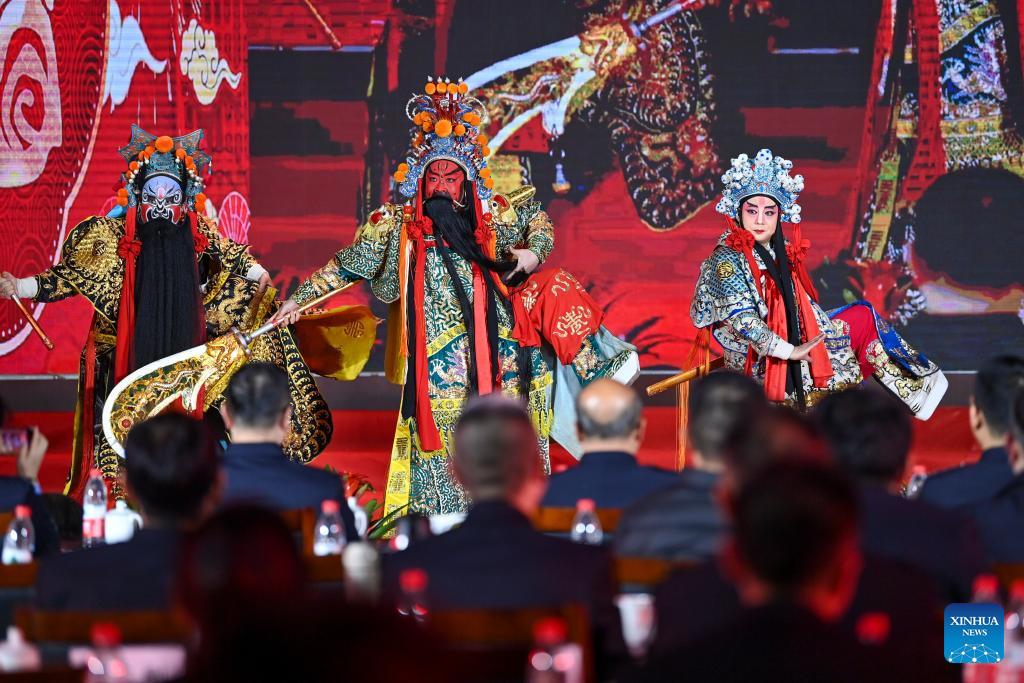
Wu Lingyun (C) stages a performance in Yingze District of Taiyuan, north China's Shanxi Province, Feb. 2, 2024. Jin Opera, originated in the central area of Shanxi Province, is a representative genre of opera in Shanxi. It was listed as a national intangible cultural heritage in 2006.
Wu Lingyun, a representative inheritor of Jin Opera, was born in a family of Jin Opera actors and entered the opera troupe at the age of 12. In 1985, when he was 21, Wu started to play the role of Guan Yu, an ancient general known for his loyalty and bravery in battles and widely revered by the Chinese. In order to play the role well, Wu went through books on the history of Three Kingdoms period (220-280 A.D.) of China, learned from experienced actors and other genres of Chinese operas, and drew inspirations from sculpture, painting, shadow play and other art forms. After years of accumulation, the role of Guan Yu has become Wu Lingyun's representative performance.
Decades of stage career have left unique marks on Wu's face. Wrinkles extend to his forehead and sideburns for he wears the head ornaments for a long time which pulls his facial skin.
At the age of retirement, he still feels the heavy responsibility of inheriting and promoting this excellent traditional culture. "I would love to keep on performing as long as the audience applaud," Wu said. (Xinhua/Yang Chenguang)
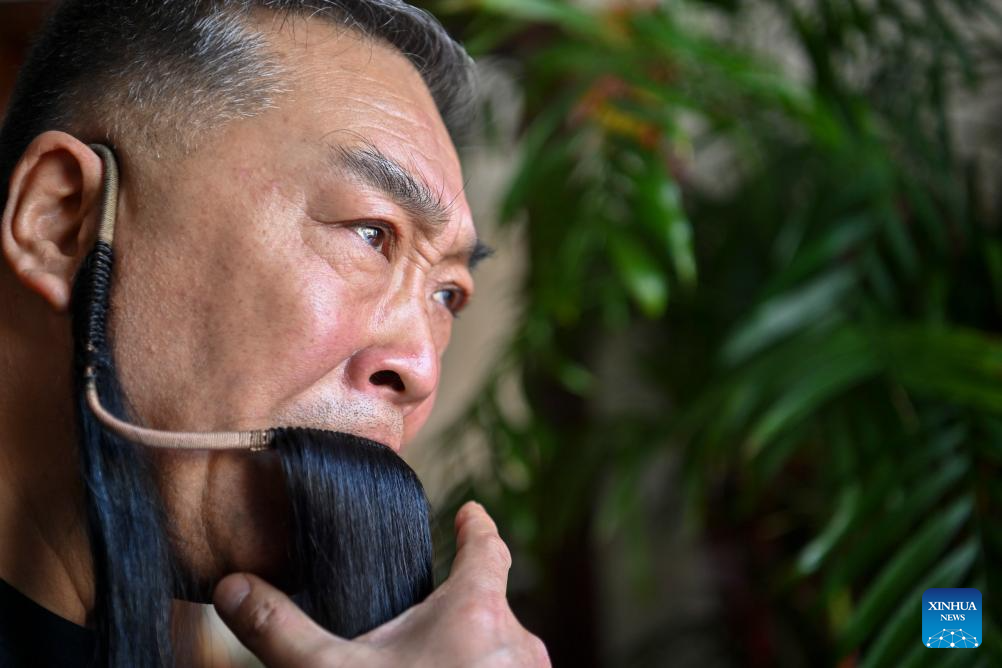
Wu Lingyun practises at home in Xinghualing District of Taiyuan, north China's Shanxi Province, March 26, 2024. Jin Opera, originated in the central area of Shanxi Province, is a representative genre of opera in Shanxi. It was listed as a national intangible cultural heritage in 2006.
Wu Lingyun, a representative inheritor of Jin Opera, was born in a family of Jin Opera actors and entered the opera troupe at the age of 12. In 1985, when he was 21, Wu started to play the role of Guan Yu, an ancient general known for his loyalty and bravery in battles and widely revered by the Chinese. In order to play the role well, Wu went through books on the history of Three Kingdoms period (220-280 A.D.) of China, learned from experienced actors and other genres of Chinese operas, and drew inspirations from sculpture, painting, shadow play and other art forms. After years of accumulation, the role of Guan Yu has become Wu Lingyun's representative performance.
Decades of stage career have left unique marks on Wu's face. Wrinkles extend to his forehead and sideburns for he wears the head ornaments for a long time which pulls his facial skin.
At the age of retirement, he still feels the heavy responsibility of inheriting and promoting this excellent traditional culture. "I would love to keep on performing as long as the audience applaud," Wu said. (Xinhua/Yang Chenguang)
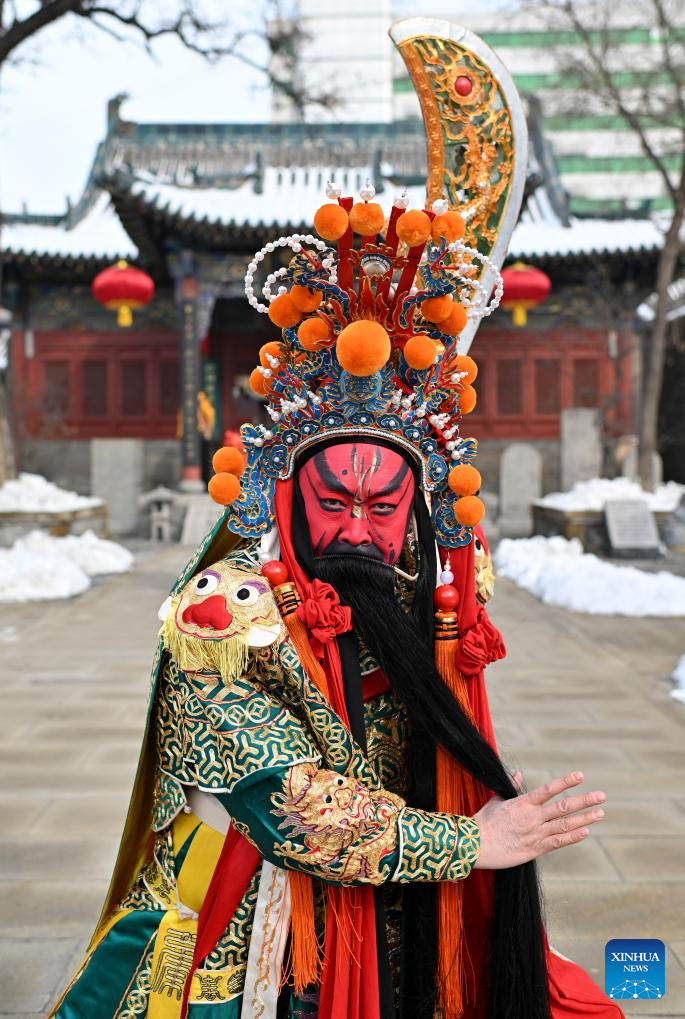
Wu Lingyun practises acting moves of Jin Opera at the Temple of Guan Yu in Yingze District of Taiyuan, north China's Shanxi Province, Feb. 23, 2024. Jin Opera, originated in the central area of Shanxi Province, is a representative genre of opera in Shanxi. It was listed as a national intangible cultural heritage in 2006.
Wu Lingyun, a representative inheritor of Jin Opera, was born in a family of Jin Opera actors and entered the opera troupe at the age of 12. In 1985, when he was 21, Wu started to play the role of Guan Yu, an ancient general known for his loyalty and bravery in battles and widely revered by the Chinese. In order to play the role well, Wu went through books on the history of Three Kingdoms period (220-280 A.D.) of China, learned from experienced actors and other genres of Chinese operas, and drew inspirations from sculpture, painting, shadow play and other art forms. After years of accumulation, the role of Guan Yu has become Wu Lingyun's representative performance.
Decades of stage career have left unique marks on Wu's face. Wrinkles extend to his forehead and sideburns for he wears the head ornaments for a long time which pulls his facial skin.
At the age of retirement, he still feels the heavy responsibility of inheriting and promoting this excellent traditional culture. "I would love to keep on performing as long as the audience applaud," Wu said. (Xinhua/Zhan Yan)
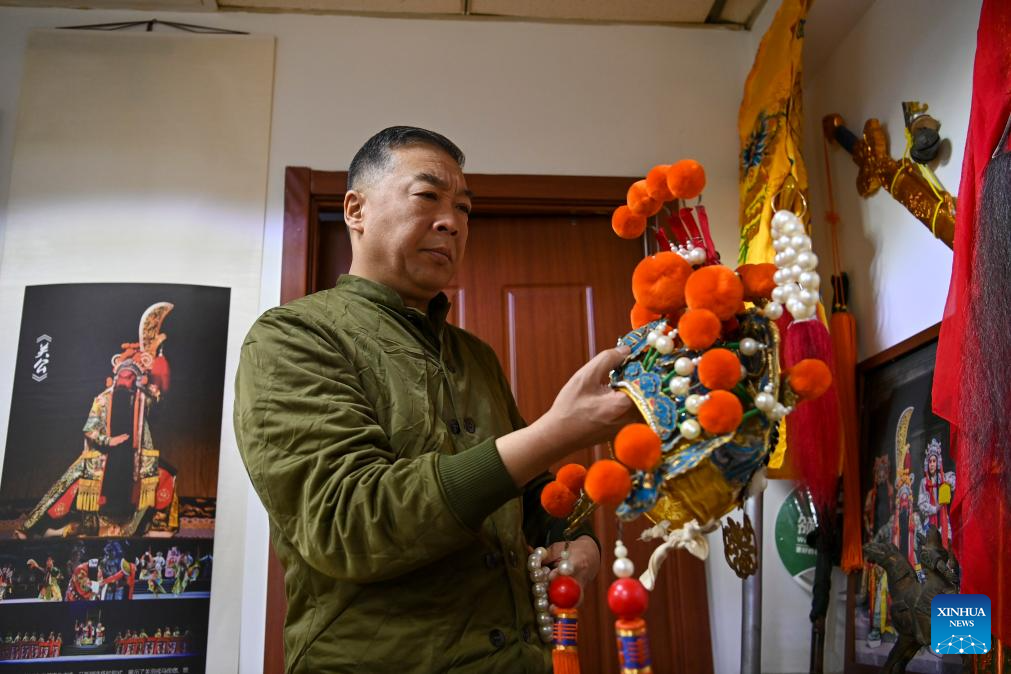
Wu Lingyun arranges props at the Jin Opera art research institute in Taiyuan, north China's Shanxi Province, Feb. 6, 2024. Jin Opera, originated in the central area of Shanxi Province, is a representative genre of opera in Shanxi. It was listed as a national intangible cultural heritage in 2006.
Wu Lingyun, a representative inheritor of Jin Opera, was born in a family of Jin Opera actors and entered the opera troupe at the age of 12. In 1985, when he was 21, Wu started to play the role of Guan Yu, an ancient general known for his loyalty and bravery in battles and widely revered by the Chinese. In order to play the role well, Wu went through books on the history of Three Kingdoms period (220-280 A.D.) of China, learned from experienced actors and other genres of Chinese operas, and drew inspirations from sculpture, painting, shadow play and other art forms. After years of accumulation, the role of Guan Yu has become Wu Lingyun's representative performance.
Decades of stage career have left unique marks on Wu's face. Wrinkles extend to his forehead and sideburns for he wears the head ornaments for a long time which pulls his facial skin.
At the age of retirement, he still feels the heavy responsibility of inheriting and promoting this excellent traditional culture. "I would love to keep on performing as long as the audience applaud," Wu said. (Xinhua/Yang Chenguang)
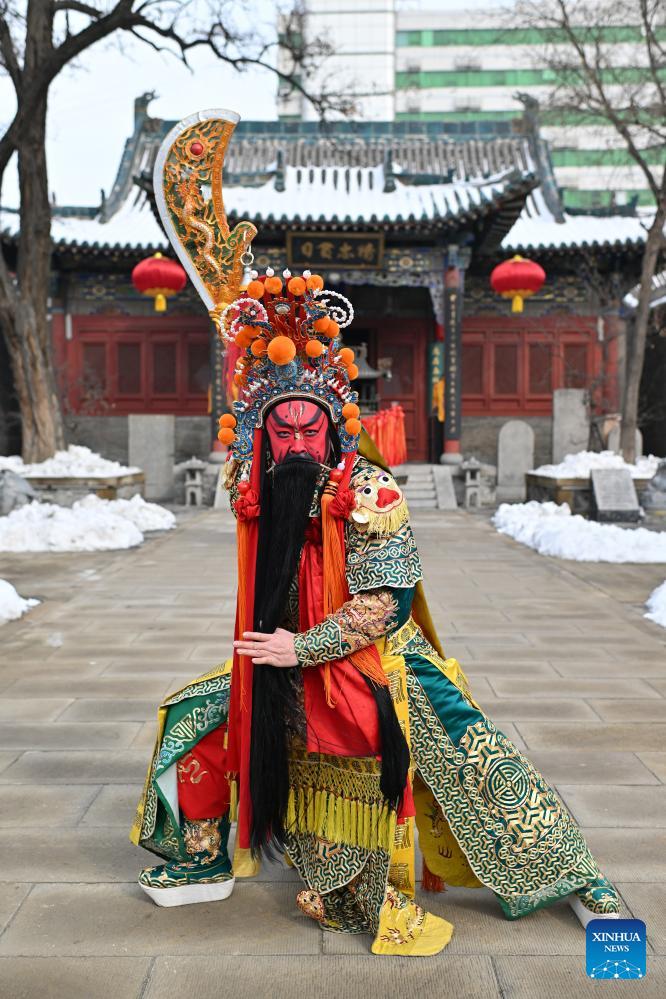
Wu Lingyun practises acting moves of Jin Opera at the Temple of Guan Yu in Yingze District of Taiyuan, north China's Shanxi Province, Feb. 23, 2024. Jin Opera, originated in the central area of Shanxi Province, is a representative genre of opera in Shanxi. It was listed as a national intangible cultural heritage in 2006.
Wu Lingyun, a representative inheritor of Jin Opera, was born in a family of Jin Opera actors and entered the opera troupe at the age of 12. In 1985, when he was 21, Wu started to play the role of Guan Yu, an ancient general known for his loyalty and bravery in battles and widely revered by the Chinese. In order to play the role well, Wu went through books on the history of Three Kingdoms period (220-280 A.D.) of China, learned from experienced actors and other genres of Chinese operas, and drew inspirations from sculpture, painting, shadow play and other art forms. After years of accumulation, the role of Guan Yu has become Wu Lingyun's representative performance.
Decades of stage career have left unique marks on Wu's face. Wrinkles extend to his forehead and sideburns for he wears the head ornaments for a long time which pulls his facial skin.
At the age of retirement, he still feels the heavy responsibility of inheriting and promoting this excellent traditional culture. "I would love to keep on performing as long as the audience applaud," Wu said. (Xinhua/Zhan Yan)
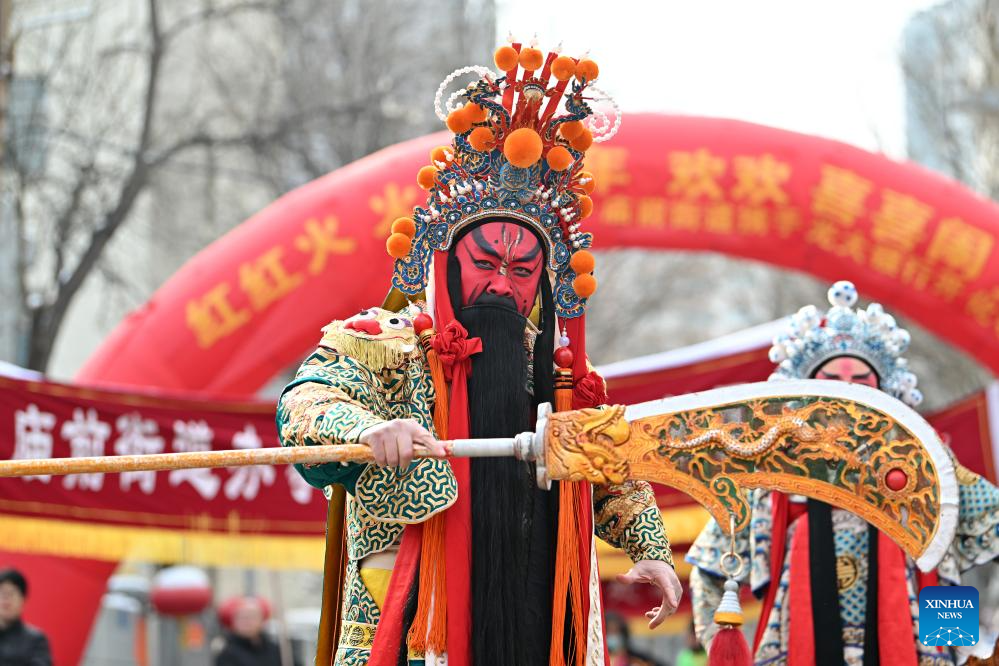
Wu Lingyun stages a performance in Yingze District of Taiyuan, north China's Shanxi Province, Feb. 23, 2024. Jin Opera, originated in the central area of Shanxi Province, is a representative genre of opera in Shanxi. It was listed as a national intangible cultural heritage in 2006.
Wu Lingyun, a representative inheritor of Jin Opera, was born in a family of Jin Opera actors and entered the opera troupe at the age of 12. In 1985, when he was 21, Wu started to play the role of Guan Yu, an ancient general known for his loyalty and bravery in battles and widely revered by the Chinese. In order to play the role well, Wu went through books on the history of Three Kingdoms period (220-280 A.D.) of China, learned from experienced actors and other genres of Chinese operas, and drew inspirations from sculpture, painting, shadow play and other art forms. After years of accumulation, the role of Guan Yu has become Wu Lingyun's representative performance.
Decades of stage career have left unique marks on Wu's face. Wrinkles extend to his forehead and sideburns for he wears the head ornaments for a long time which pulls his facial skin.
At the age of retirement, he still feels the heavy responsibility of inheriting and promoting this excellent traditional culture. "I would love to keep on performing as long as the audience applaud," Wu said. (Xinhua/Zhan Yan)
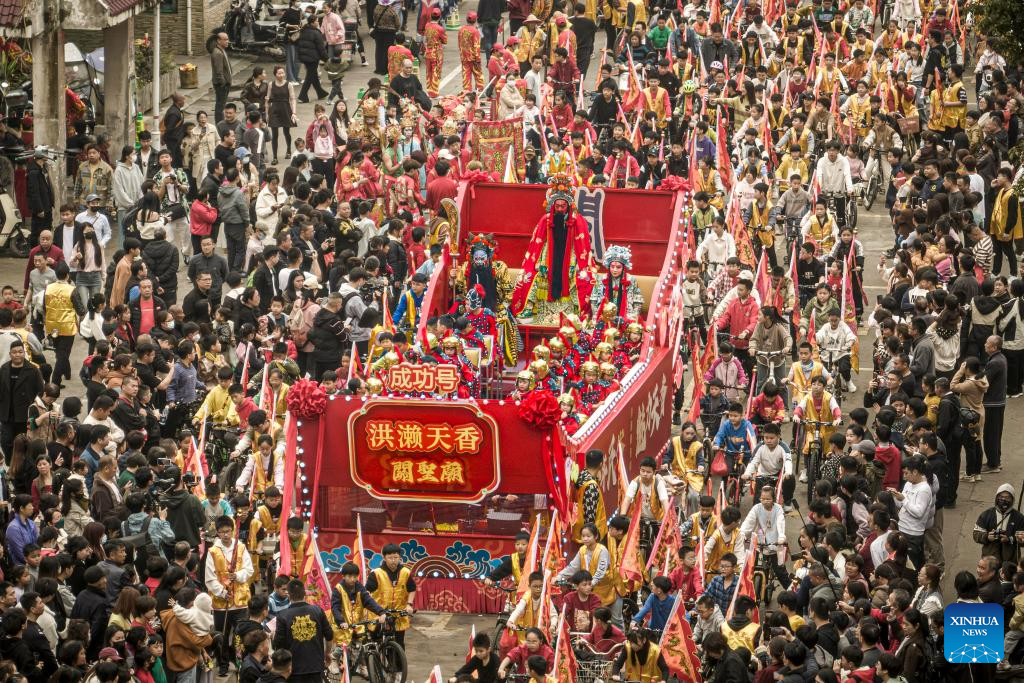
Wu Lingyun (C) and his troupe members take part in an activity in Honglai Township of Nan'an City, southeast China's Fujian Province, March 16, 2024. Jin Opera, originated in the central area of Shanxi Province, is a representative genre of opera in Shanxi. It was listed as a national intangible cultural heritage in 2006.
Wu Lingyun, a representative inheritor of Jin Opera, was born in a family of Jin Opera actors and entered the opera troupe at the age of 12. In 1985, when he was 21, Wu started to play the role of Guan Yu, an ancient general known for his loyalty and bravery in battles and widely revered by the Chinese. In order to play the role well, Wu went through books on the history of Three Kingdoms period (220-280 A.D.) of China, learned from experienced actors and other genres of Chinese operas, and drew inspirations from sculpture, painting, shadow play and other art forms. After years of accumulation, the role of Guan Yu has become Wu Lingyun's representative performance.
Decades of stage career have left unique marks on Wu's face. Wrinkles extend to his forehead and sideburns for he wears the head ornaments for a long time which pulls his facial skin.
At the age of retirement, he still feels the heavy responsibility of inheriting and promoting this excellent traditional culture. "I would love to keep on performing as long as the audience applaud," Wu said. (Xinhua)
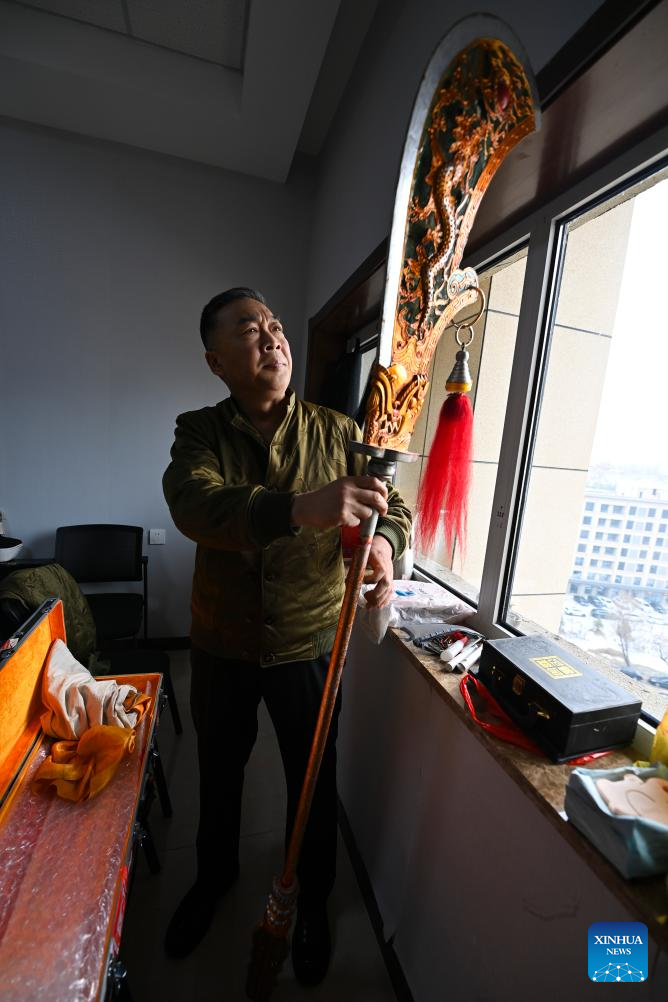
Wu Lingyun checks the props ahead of a performance in Yingze District of Taiyuan, north China's Shanxi Province, Feb. 2, 2024. Jin Opera, originated in the central area of Shanxi Province, is a representative genre of opera in Shanxi. It was listed as a national intangible cultural heritage in 2006.
Wu Lingyun, a representative inheritor of Jin Opera, was born in a family of Jin Opera actors and entered the opera troupe at the age of 12. In 1985, when he was 21, Wu started to play the role of Guan Yu, an ancient general known for his loyalty and bravery in battles and widely revered by the Chinese. In order to play the role well, Wu went through books on the history of Three Kingdoms period (220-280 A.D.) of China, learned from experienced actors and other genres of Chinese operas, and drew inspirations from sculpture, painting, shadow play and other art forms. After years of accumulation, the role of Guan Yu has become Wu Lingyun's representative performance.
Decades of stage career have left unique marks on Wu's face. Wrinkles extend to his forehead and sideburns for he wears the head ornaments for a long time which pulls his facial skin.
At the age of retirement, he still feels the heavy responsibility of inheriting and promoting this excellent traditional culture. "I would love to keep on performing as long as the audience applaud," Wu said. (Xinhua/Yang Chenguang)
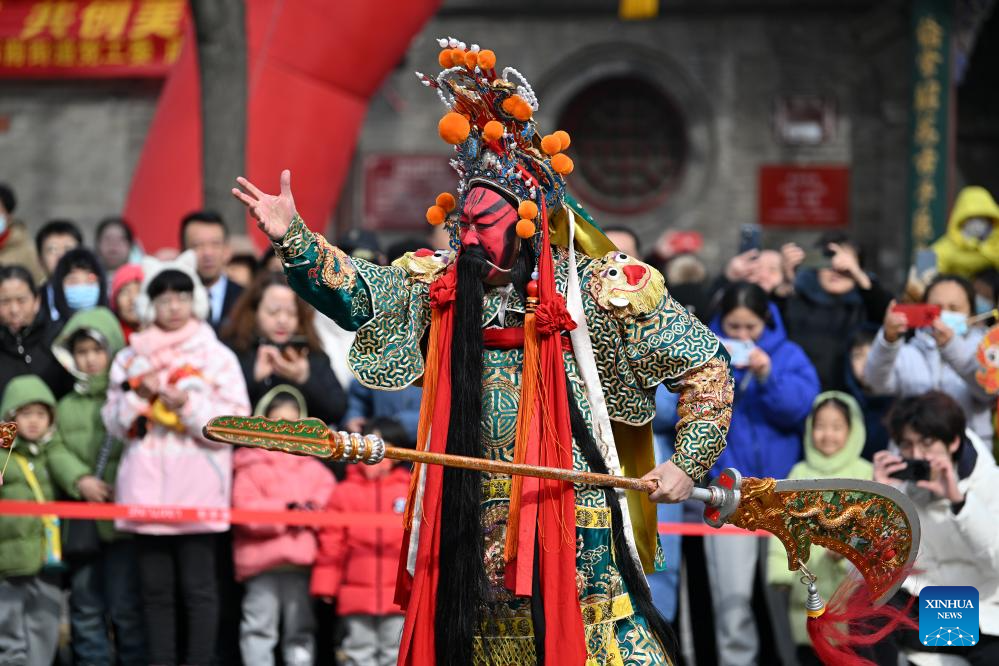
Wu Lingyun stages a performance in Yingze District of Taiyuan, north China's Shanxi Province, Feb. 23, 2024. Jin Opera, originated in the central area of Shanxi Province, is a representative genre of opera in Shanxi. It was listed as a national intangible cultural heritage in 2006.
Wu Lingyun, a representative inheritor of Jin Opera, was born in a family of Jin Opera actors and entered the opera troupe at the age of 12. In 1985, when he was 21, Wu started to play the role of Guan Yu, an ancient general known for his loyalty and bravery in battles and widely revered by the Chinese. In order to play the role well, Wu went through books on the history of Three Kingdoms period (220-280 A.D.) of China, learned from experienced actors and other genres of Chinese operas, and drew inspirations from sculpture, painting, shadow play and other art forms. After years of accumulation, the role of Guan Yu has become Wu Lingyun's representative performance.
Decades of stage career have left unique marks on Wu's face. Wrinkles extend to his forehead and sideburns for he wears the head ornaments for a long time which pulls his facial skin.
At the age of retirement, he still feels the heavy responsibility of inheriting and promoting this excellent traditional culture. "I would love to keep on performing as long as the audience applaud," Wu said. (Xinhua/Zhan Yan)
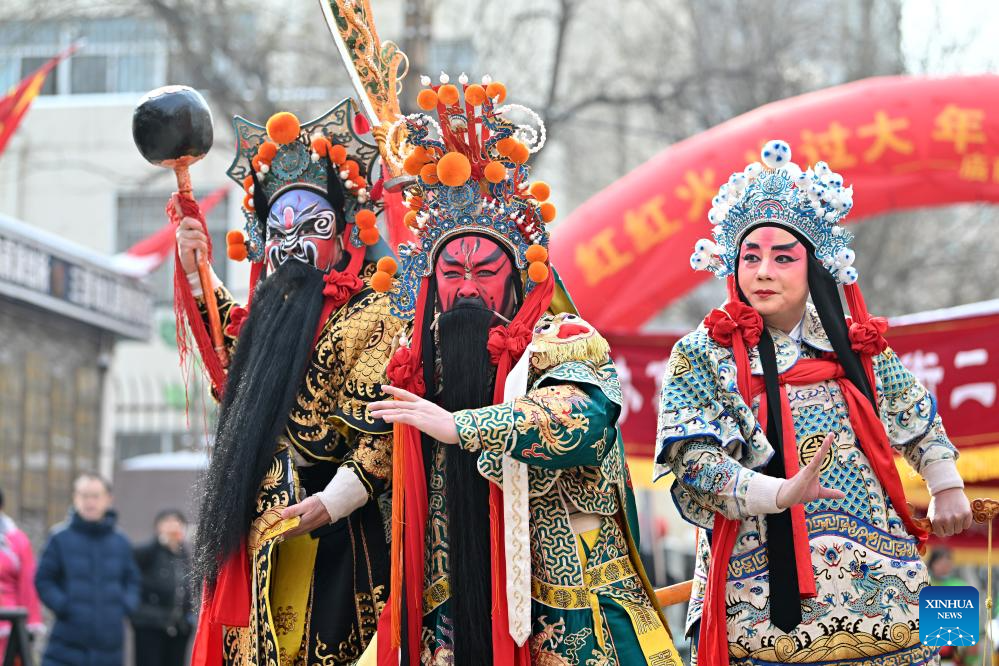
Wu Lingyun (C) stages a performance in Yingze District of Taiyuan, north China's Shanxi Province, Feb. 23, 2024. Jin Opera, originated in the central area of Shanxi Province, is a representative genre of opera in Shanxi. It was listed as a national intangible cultural heritage in 2006.
Wu Lingyun, a representative inheritor of Jin Opera, was born in a family of Jin Opera actors and entered the opera troupe at the age of 12. In 1985, when he was 21, Wu started to play the role of Guan Yu, an ancient general known for his loyalty and bravery in battles and widely revered by the Chinese. In order to play the role well, Wu went through books on the history of Three Kingdoms period (220-280 A.D.) of China, learned from experienced actors and other genres of Chinese operas, and drew inspirations from sculpture, painting, shadow play and other art forms. After years of accumulation, the role of Guan Yu has become Wu Lingyun's representative performance.
Decades of stage career have left unique marks on Wu's face. Wrinkles extend to his forehead and sideburns for he wears the head ornaments for a long time which pulls his facial skin.
At the age of retirement, he still feels the heavy responsibility of inheriting and promoting this excellent traditional culture. "I would love to keep on performing as long as the audience applaud," Wu said. (Xinhua/Zhan Yan)
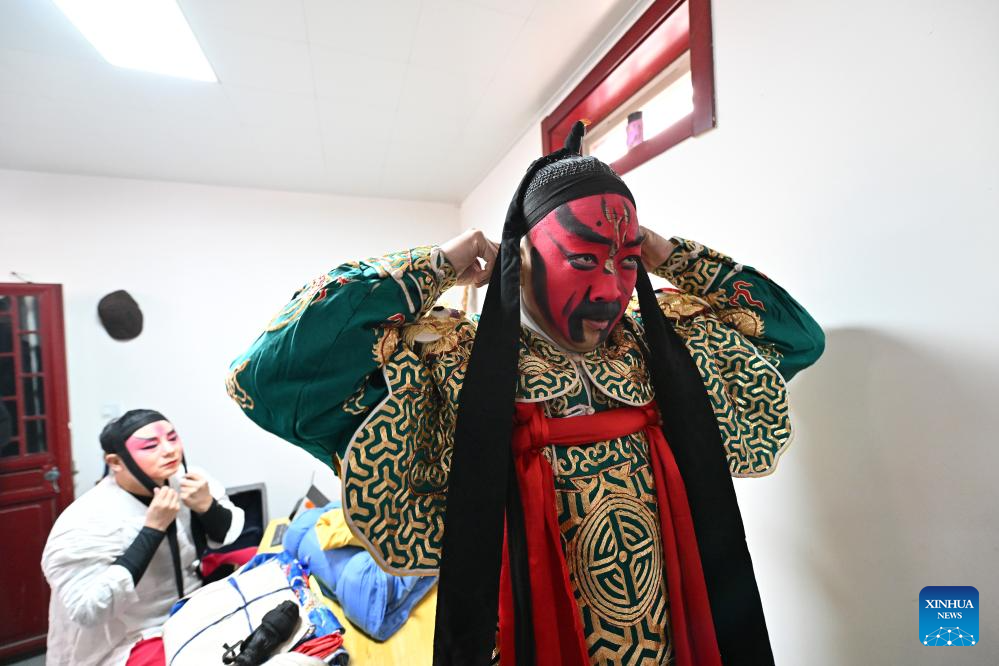
Wu Lingyun (R) prepares for a performance at the Temple of Guan Yu in Yingze District of Taiyuan, north China's Shanxi Province, Feb. 23, 2024. Jin Opera, originated in the central area of Shanxi Province, is a representative genre of opera in Shanxi. It was listed as a national intangible cultural heritage in 2006.
Wu Lingyun, a representative inheritor of Jin Opera, was born in a family of Jin Opera actors and entered the opera troupe at the age of 12. In 1985, when he was 21, Wu started to play the role of Guan Yu, an ancient general known for his loyalty and bravery in battles and widely revered by the Chinese. In order to play the role well, Wu went through books on the history of Three Kingdoms period (220-280 A.D.) of China, learned from experienced actors and other genres of Chinese operas, and drew inspirations from sculpture, painting, shadow play and other art forms. After years of accumulation, the role of Guan Yu has become Wu Lingyun's representative performance.
Decades of stage career have left unique marks on Wu's face. Wrinkles extend to his forehead and sideburns for he wears the head ornaments for a long time which pulls his facial skin.
At the age of retirement, he still feels the heavy responsibility of inheriting and promoting this excellent traditional culture. "I would love to keep on performing as long as the audience applaud," Wu said. (Xinhua/Zhan Yan)



